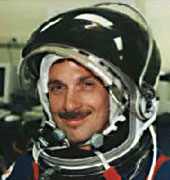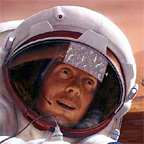|
John Connolly
–
human space exploration engineer
|

|
"
We will find life on Mars one day – and it will be us."
|

|
| |
|
|
|
| |
How were you motivated to choose your particular field? |
| |
I was nine when Neil Armstrong and Buzz Aldrin first walked on the moon,
and even by then I loved everything that had to do with space. My uncle
knew someone down at NASA, and beginning when I was about six I would
receive a big box of pictures and press releases in the mail each year –
it was probably just something this guy was going to throw out, but
instead he packed all this stuff, this NASA stuff, into a box and sent
it to me when it got full. I had no idea what most of it was, but I did
know that it was all about the future, and about making reality out of
what most people just dream about.
The other event I remember that turned me on to "rocket science" was the
first Estes catalog I ever saw. This was also in 1969, and I couldn't
believe that toys could be so cool – you could build an actual rocket and
FLY it – fire and smoke and everything, just like the big ones! I still
build model rockets today, but like most things as you grow up, my model
rockets have gotten bigger and more complex.
I was a good student in school – math and science came real easy to me. So
I decided to study engineering at Penn State and the University of Colorado.
One day, sure enough, NASA called and asked me if I wanted to work on
human lunar and Mars missions. Now I'm part of the Exploration Office
at the Johnson Space Center, and every so often folks like Buzz Aldrin
poke their head into our office, sit down, and want to see what we're
working on. All of this taught me that anything you can dream, you can
do. And that dreams do come true.
|
|

|
| |
|
|
|
| |
What can you share about your creative process? |
| |

|
|
To me the creative process is all about having new ideas and figuring out
how to use these new ideas. I feel pretty lucky because new ideas pop into
my head all of the time. I try not to let myself get caught into thinking
about the "usual" way of doing things, but to let my mind wander out
towards other, unique ways to accomplish the same goal. An example, in
the space business, is how we might bring a spacecraft to Mars. The
goal is to land the spacecraft without damaging it, and to do this we
usually use parachutes and rocket engines. But there are other ways to
land a spacecraft without damaging it, like using airbags the way we
did for the Mars Pathfinder mission – a new and creative idea that
accomplished its goal in a new way.
When I think of a new idea, I first try to figure out how it fits in the
"big picture". No problem exists simply by itself – everything is part
of a
bigger "system", which just means that things depends on other things to
work. So when I want to be creative, I imagine a problem as a series of
pieces that are all connected together, like the gears in a watch. If you
change one piece, you need to imagine how it changes all the other pieces.
The airbag that was used to land Pathfinder, for example, made us look
at a
totally new shape and design of spacecraft.
|
|
| |
|
|
|
| |
What ideas do you have for a future human community on Mars?
|
| |
First of all, this WILL happen, the only question is WHEN? I think that
humans will occupy Mars in much the same way that they settled many
parts of the Earth – first starting off in small groups, exploring the planet,
looking for resources and understanding how to survive there. This is the
part that NASA is good at, and it's a lot like the stories of Lewis and
Clark exploring the American west.
Once you have an understanding of Mars and how to survive there, you can
start bringing people who want to build a permanent outpost, and stay there
for a long time. These people are different from current astronauts,
because they are most concerned with, well, building a city! So you need
people like carpenters and plumbers and architects and heavy equipment
operators to build the infrastructure. Then you need farmers, doctors,
vets, and lots of good fix-it people to keep the place going.
One of the important things we'll need to learn is how to "live off the
land" – that is, how to use the natural resources of Mars (like the soil and
atmosphere) to make useful products (like oxygen or building materials),
grow food, and create energy. The more we live off the land on Mars, the
less we'll have to depend on Earth for any supplies. Eventually, the people
who live on Mars should be able to make everything they need to survive
and prosper.
We will find life on Mars one day – and it will be us.
|
|

|
|




